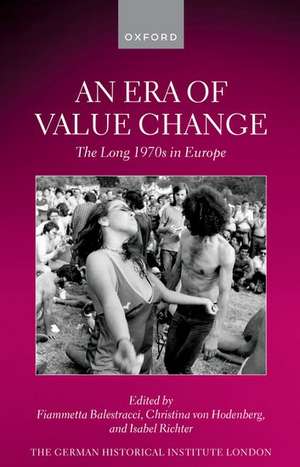An Era of Value Change: The Long 1970s in Europe: Studies of the German Historical Institute, London
Editat de Fiammetta Balestracci, Christina von Hodenberg, Isabel Richteren Limba Engleză Hardback – 8 aug 2024
Preț: 500.03 lei
Preț vechi: 690.00 lei
-28% Nou
Puncte Express: 750
Preț estimativ în valută:
95.69€ • 103.91$ • 80.38£
95.69€ • 103.91$ • 80.38£
Carte disponibilă
Livrare economică 22-28 martie
Preluare comenzi: 021 569.72.76
Specificații
ISBN-13: 9780198928997
ISBN-10: 0198928998
Pagini: 345
Dimensiuni: 150 x 225 x 25 mm
Greutate: 0.61 kg
Editura: OUP OXFORD
Colecția OUP Oxford
Seria Studies of the German Historical Institute, London
Locul publicării:Oxford, United Kingdom
ISBN-10: 0198928998
Pagini: 345
Dimensiuni: 150 x 225 x 25 mm
Greutate: 0.61 kg
Editura: OUP OXFORD
Colecția OUP Oxford
Seria Studies of the German Historical Institute, London
Locul publicării:Oxford, United Kingdom
Notă biografică
Fiammetta Balestracci is a specialist in contemporary history with interests in the history of Germany, the history of the Italian Communist Party, and the history of sexuality. She obtained her Ph.D at the University of Milan and was recently awarded her habilitation in Italy. In 2017-19 she was awarded a Marie Sklodowska-Curie Individual Fellowship to focus on the transformation of female sexuality in Italy and Germany during the long 1970s. She has worked at many Italian and European universities and research institutes, including Queen Mary University of London and LMU Munich.Christina von Hodenberg is the Director of the German Historical Institute London (GHIL) and a Professor in European History at Queen Mary University of London. She has written five monographs in the fields of media history, social protest, and gender history. Her most recent book, a revisionist account of the late 1960s protest movements, will be published as The Other 1968: Social History of a West German Revolt with Oxford University Press in 2024.Isabel Richter is a Deputy Director at the German Historical Institute Washington DC where she has led the GHI Pacific Office at the University of California, Berkeley since autumn 2023. She studied modern history, German studies, and Spanish and received her Ph.D. in modern history from the TU Berlin and her habilitation from the Ruhr University Bochum. Her research interests include German cultural history (late eighteenth century to the present), National Socialism and its aftermath, resistance and countercultures in the twentieth century, the global 1960s, and the history of life stages (youth, ageing, end of life, and death).








